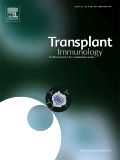
Transplant Immunology
Scope & Guideline
Connecting Theory and Practice in Transplant Immunology.
Introduction
Aims and Scopes
- Transplant Rejection Mechanisms:
The journal explores the cellular and molecular mechanisms underlying both acute and chronic rejection in solid organ and hematopoietic stem cell transplants, providing insights into immune responses and their modulation. - Immunosuppressive Strategies:
Research on various immunosuppressive regimens, including the efficacy and safety of novel agents, is a core focus. The journal evaluates the impact of these therapies on transplant outcomes and patient survival. - Infection and Immunity:
The relationship between infections, particularly viral infections like CMV and COVID-19, and their effects on transplant recipients' immune response is a significant area of investigation. - Biomarkers and Diagnostics:
The identification and validation of biomarkers for predicting transplant outcomes, rejection, and complications are emphasized, aiding in the development of personalized medicine approaches. - Cell Therapy and Regenerative Medicine:
The application of stem cell therapies and regenerative medicine techniques in improving transplant outcomes and managing rejection is increasingly featured in the journal. - Ethical and Societal Issues in Transplantation:
The journal also addresses ethical considerations and societal impacts of organ transplantation, including donor-recipient matching, allocation policies, and public perceptions.
Trending and Emerging
- COVID-19 and Transplantation:
The impact of COVID-19 on transplant recipients, including vaccination responses and infection management, has become a prominent theme, reflecting the pandemic's influence on healthcare. - Machine Learning and Bioinformatics:
The integration of machine learning and bioinformatics in predicting transplant outcomes and personalizing immunosuppressive therapy is gaining traction, indicating a shift towards data-driven approaches in transplantation. - Microbiome and Immune Interactions:
Research exploring the role of the gut microbiome in modulating immune responses in transplant recipients is emerging, highlighting the importance of microbial health in transplantation. - Cell-Based Therapies:
The use of cell-based therapies, particularly involving mesenchymal stem cells and regulatory T cells, is increasingly featured, indicating a growing interest in regenerative approaches to manage rejection. - Longitudinal Studies and Real-World Data:
There is a rising emphasis on longitudinal studies and the use of real-world data to assess long-term outcomes and complications post-transplantation, providing a more comprehensive understanding of transplant success.
Declining or Waning
- Traditional Immunosuppressive Agents:
Research focusing solely on traditional immunosuppressive agents like calcineurin inhibitors has seen a decline as newer, more targeted therapies gain interest and application in clinical settings. - Generalized Risk Factors for Rejection:
While risk factors for transplant rejection remain important, the focus has shifted towards more specific biomarkers and mechanistic studies rather than broad, generalized factors. - Descriptive Case Reports:
While case reports are valuable, there is a noticeable decrease in the publication of purely descriptive case reports, with a preference for studies that provide mechanistic insights or larger cohort analyses.
Similar Journals

XENOTRANSPLANTATION
Pioneering Innovations in XenotransplantationXENOTRANSPLANTATION is a premier journal published by Wiley, dedicated to advancing the field of transplant medicine and immunology. Since its inception in 1994, this journal has provided a vital platform for researchers to disseminate groundbreaking studies and reviews, focusing on the complexities of xenotransplantation—the transplantation of organs and tissues from one species to another. With an impressive impact factor emphasizing its relevance, it has garnered recognition in the 2023 rankings, achieving Q1 status in the field of Transplantation and Q2 in Immunology. This positions it among the top journals, ranked #12 out of 54 in Transplantation and #102 out of 236 in Immunology, according to Scopus metrics. Despite being a subscription-based journal, its commitment to high-quality research ensures that it remains essential for professionals, researchers, and students seeking to innovate and facilitate progress in the increasingly critical area of organ transplantation. XENOTRANSPLANTATION is not just a journal; it is a crucial resource for fostering collaboration and knowledge in a field that continually shapes the future of medicine.

ImmunoTargets and Therapy
Advancing Immunology, Transforming TherapiesImmunoTargets and Therapy is a leading open access journal published by DOVE MEDICAL PRESS LTD, dedicated to advancing the field of immunology and its various therapeutic applications. Since its inception in 2012, the journal has rapidly become a vital resource for researchers, professionals, and students, achieving notable recognition with a Q1 ranking in both Immunology and Immunology and Allergy categories as of 2023. With an impressive Scopus ranking of #22 out of 233 in Medicine - Immunology and Allergy, and #25 out of 236 in Immunology and Microbiology, this journal maintains a 90th percentile standing in its field. ImmunoTargets and Therapy not only publishes original research articles, reviews, and clinical studies, but also fosters an inclusive platform for the dissemination of innovative findings critical to the fight against immunological disorders. Based in New Zealand, it serves a global audience, promoting knowledge exchange and collaboration through its open access model.
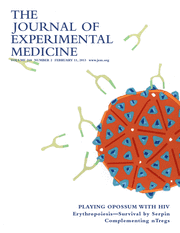
JOURNAL OF EXPERIMENTAL MEDICINE
Exploring the Depths of Disease MechanismsJOURNAL OF EXPERIMENTAL MEDICINE, published by Rockefeller University Press, is a renowned peer-reviewed journal dedicated to advancing the field of experimental medicine since its inception in 1896. With an impressive impact factor and categorized in the Q1 quartile for Immunology, Immunology and Allergy, and Miscellaneous Medicine, this journal stands at the forefront of medical research and innovation. It provides a prestigious platform for scholars and practitioners to disseminate groundbreaking findings that drive the understanding of disease mechanisms and therapeutic strategies. While the journal is not open access, it maintains high visibility and engagement within the scientific community, fostering collaboration among researchers, professionals, and students alike. The journal's consistent ranking in the top percentiles of Scopus illustrates its significant impact and commitment to excellence in medical research.
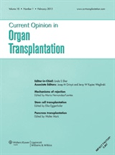
Current Opinion in Organ Transplantation
Shaping the Future of Immunology and TransplantationCurrent Opinion in Organ Transplantation, published by Lippincott Williams & Wilkins, serves as a leading journal in the fields of immunology and transplantation, providing insightful reviews and expert opinions that shape the discourse in these vital areas of medical research. With an impact factor showcasing its significance and influence in the academic community, this journal is ranked in the Q2 category for both Immunology and Transplantation according to the 2023 metrics, affirming its essential role in advancing knowledge and understanding. Spanning from its inception in 2001 through to 2024, Current Opinion in Organ Transplantation offers a platform for researchers, professionals, and students to engage with the latest advancements and trends, contributing to the ongoing dialogue that drives innovation in organ transplantation and immunological therapies. Although the journal does not currently offer open access options, its rigorous peer-review process and reputable publisher ensure the highest quality of research dissemination, making it an invaluable resource for those invested in the future of organ transplantation.
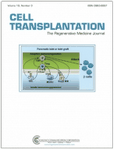
CELL TRANSPLANTATION
Empowering the next generation of transplantation science.CELL TRANSPLANTATION is a premier multidisciplinary journal dedicated to advancing the field of regenerative medicine and transplantation, published by SAGE PUBLICATIONS INC. Since its initiation in 1992 and embracing an open-access model since 2017, the journal aims to disseminate high-quality research that covers both clinical and experimental studies on cell and tissue transplantation. With a notable impact reflected in its 2023 Q2 ranking in Biomedical Engineering and significant standings in Cell Biology and Transplantation, CELL TRANSPLANTATION serves as a vital resource for researchers, practitioners, and students alike. The journal's commitment to fostering innovation is evident in its diverse contributions that address the complexities of tissue engineering, immunology, and regenerative therapies, inviting readers to engage with cutting-edge science that is poised to transform medical practices and improve patient outcomes. The journal's insightful articles and research findings make it a crucial platform for knowledge exchange within the vibrant scientific community.
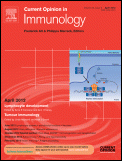
CURRENT OPINION IN IMMUNOLOGY
Transforming Perspectives in Immune ResearchCURRENT OPINION IN IMMUNOLOGY is a prestigious journal dedicated to the dynamic field of immunology, published by CURRENT BIOLOGY LTD in the United Kingdom. With an ISSN of 0952-7915 and an E-ISSN of 1879-0372, this journal has been a cornerstone of scholarly communication since its inception in 1988 and continues to disseminate cutting-edge research and reviews aimed at advancing our understanding of immune responses. Holding a remarkable Q1 ranking in both Immunology and Allergy categories for 2023, it ranks impressively within the top percentiles in its field, securing 27th233 in Immunology and Allergy and 31st out of 236 in Immunology and Microbiology. Emphasizing high-impact research, the journal provides researchers, professionals, and students with valuable insights into emerging trends and critical developments. As a vital resource in immunological research, it serves as a platform for disseminating innovative findings, fostering collaboration, and enhancing scholarly exchange in a rapidly evolving scientific landscape.
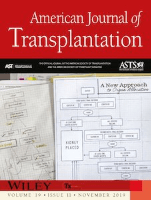
AMERICAN JOURNAL OF TRANSPLANTATION
Advancing transplantation science for a healthier tomorrow.American Journal of Transplantation, published by Elsevier Science Inc, is a premier academic journal dedicated to the critical field of transplantation. With an impressive impact factor and prestigious rankings in Immunology and Allergy, Pharmacology (medical), and Transplantation, it stands as a leading source of high-quality research in these domains, boasting a Q1 category status since 2023. The journal serves an essential role in advancing scientific knowledge and clinical practices, publishing cutting-edge studies that address pressing issues in organ transplantation and immunology. Researchers, healthcare professionals, and students will find valuable insights through rigorous peer-reviewed articles that focus on innovative methodologies, outcomes, and the latest developments within transplantation science. As the journal continues to evolve from its inception in 2001 to its ongoing contributions through 2024, it remains a key resource for those looking to stay at the forefront of transplantation research and practice.
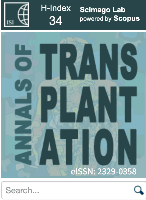
Annals of Transplantation
Empowering Researchers to Drive Medical InnovationAnnals of Transplantation is a renowned academic journal published by INT SCIENTIFIC INFORMATION, INC, dedicated to the field of transplantation medicine. With a strong historical presence since its inception in 1996, this journal continues to provide a vital platform for disseminating innovative research, clinical studies, and review articles that contribute significantly to the ever-evolving landscape of organ transplantation. Holding a respectable Q2 ranking in the field of transplantation and a Q3 ranking in broader medicine categories as of 2023, the journal stands out with an impactful repository of knowledge that caters to a diverse audience, including researchers, healthcare professionals, and students. While it currently does not operate under an open access model, the scholarly contributions within are crucial for advancing practices, policies, and outcomes in transplantation. Whether you are seeking to keep abreast of recent advances or looking to publish your own findings, Annals of Transplantation serves as an essential resource for fostering collaboration and innovation in medical science.

HLA
Pioneering Insights in Genetics and AllergyHLA, published by WILEY, is a distinguished academic journal that serves as a vital resource in the fields of Immunology, Genetics, and Allergy. With an ISSN of 2059-2302 and an E-ISSN of 2059-2310, HLA aims to provide cutting-edge research and developments that expand our understanding of human immunology, particularly concerning histocompatibility and antigen systems. Although it currently holds a Q4 quartile ranking in several categories—including Genetics and Immunology—it offers a platform for innovative studies that can catalyze new insights within the scientific community. The journal operates on an Open Access model, ensuring broader accessibility and engagement with emerging discoveries. Researchers, healthcare professionals, and students alike are encouraged to contribute to and utilize this journal to foster advancements in this rapidly evolving field. For submissions and more information, authors can navigate directly to its online portal, embracing the ongoing discourse in immunological research.
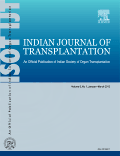
Indian Journal of Transplantation
Championing Open Access for Transplantation InsightsIndian Journal of Transplantation (ISSN: 2212-0017, E-ISSN: 2212-0025), published by Wolters Kluwer Medknow Publications, serves as a pivotal resource in the expanding field of transplantation medicine. As an Open Access journal since 2011, it provides unrestricted access to cutting-edge research, facilitating the dissemination of knowledge among practitioners, researchers, and students globally. With a growing focus on transplant-related advancements from 2020 to 2024, the journal has positioned itself within the Q4 category in Transplantation, underscoring its commitment to publishing valuable contributions that aim to enhance clinical practices and improve patient outcomes. Situated in the Netherlands, the journal upholds high-quality standards, inviting submissions that contribute to the understanding of various transplant procedures and practices, ultimately fostering innovation in the field. Researchers and professionals are encouraged to explore the vast array of articles, enhancing both their expertise and the community's collective knowledge in transplantation.